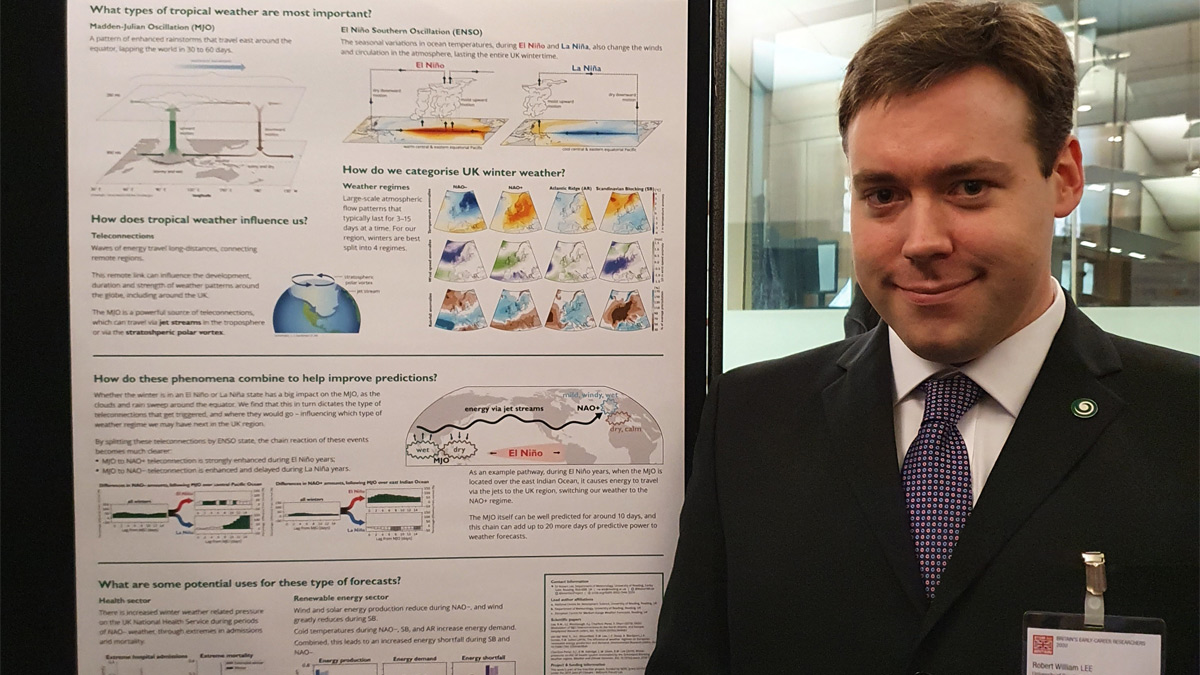UK's only dedicated university Meteorology department
The Department of Meteorology at the University of Reading is one of the world's largest academic communities of atmospheric, ocean and space physicists specialising in the natural environment.
Before applying to university, Robert took the chance to visit the Department at Reading and learn more for himself first hand.
"I went to several events at Reading to meet as many professors as I could, to ask questions and prepare myself. The fact that there was a whole Department of like-minded people was great. The professors were very enthusiastic about their subjects and research, they were relatable and kind. I was confident that Reading would be a good fit for me and that the academics were knowledgeable and supportive."
Observing storms in Oklahoma
As a student on the MMet Meteorology and Climate with a Year in Oklahoma, Robert spent a year studying at the University of Oklahoma.
As well as gaining knowledge from a range of skilled academics, Robert got to see severe weather events first-hand – this was of such an interest to Robert he would visit Oklahoma at a later date on vacation.
"One day we'd be learning the theory behind thunderstorms and tornado formation and the next we might be out observing a thunderstorm. We'd be able to recognise the different elements in the atmosphere and what we were learning about in theory."
Discovering a route to research
Robert identifies two experiences that helped him confirm a preferred career path in research.
Firstly, he received a scholarship summer placement to work at the Met Office, where the University has strong links, and has been contributing to official UK Met Office statistics since 1903.
The University of Reading is also part of the Met Office Academic Partnership (MOAP) a cluster of collaboration and research excellence involving the Met Office and leading UK Universities in weather and climate.
"I worked with the Atmospheric Processes and Parametrization team investigating the effect recent advances in cloud microphysics models had on some heavy snowfall case studies. I also got the chance to shadow the Chief Forecaster – seeing both sides of a meteorology career."
During this valuable placement at the Met Office, Robert's supervisor was Dr Jonathan Wilkinson who completed his BSc and PhD at the University of Reading. This showed Robert first-hand the type of career path that Reading's Department of Meteorology alumni could take.
Robert also enjoyed his final year undergraduate dissertation where he was able to research and publish his own project.
"My dissertation was supervised by Dr Kevin Hodges. We used his algorithm to track extra-tropical cyclones, which are the regular winter storms we get here in the UK. We looked at how these compare in reanalysis, with different organisations across the world doing this differently. I enjoyed the challenge of presenting these observations in a new, harmonious data set."
Cycle of knowledge
Since his dissertation Robert has stayed in touch with Dr Kevin Hodges, an emblematic trait of a Department that works, and learns, together.
"I am still in touch with Dr Kevin Hodges, whose office is now just around the corner from mine. In the past few weeks we've had two papers published together, of which we were co-authors.
"Reading is pretty unique as a community, from academics to PhD to undergraduate students. You can always get help from anyone. For example, as a PhD student, having over 60 other PhD students means there is always someone to go to and ask for advice or help with a certain topic, which is also the same for academics.
"The fact we have so many seminars going on within the Department and research group meetings means you are always learning right through your career. There's always a cycle of knowledge going on."
Research role
"In my current role I've been looking at predictions of weather on sub-seasonal timescales. These tend to be given 10-30 days in advance. They can be useful for sectors such as energy, agriculture, health. Businesses need sub-seasonal weather forecasting.
"A project I worked on looked at the dynamical links in predictions of 10 to 30 day timescales. This explored how two different processes of weather in the tropics affect our weather in Europe on a 10 to 30 day timeframe. The evidence shows the remarkable interconnectedness of the world's weather."
Robert enjoyed working on this with knowledgeable colleagues in the Department, including Professor Steve Woolnough, Professor Andrew Charlton-Perez, and Dr Frederic Vitart.
He also regularly collaborated with the European Centre for Medium-Range Weather Forecasts (ECMWF), which has world-leading expertise in forecasting to these timeframes.
"All of the experience I got from my undergraduate studies, PhD and dissertation were all vital in making me a successful researcher."
Learn about our undergraduate courses
Read about PhD study at Reading
Find out about research in the Department of Meteorology
